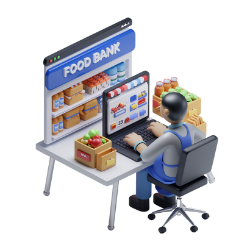Learning to Build an Open Source Food Bank Inventory Management System with AI Assistance
Learning to Build an Open Source Food Bank Inventory Management System with AI Assistance
Building a robust application as a solo developer is a challenging endeavor, especially when the end goal is to create an open-source tool capable of transforming community operations. With the advancements in AI, however, tackling such projects is more achievable than ever. This is the story of how AI is helping shape the development of the Food Bank Inventory Management System (FBIMS)—a project still in its early stages but already showing promise as a tool to help food banks operate more efficiently.
The Vision Behind FBIMS
The inspiration for FBIMS is deeply personal. The project’s developer, John, shared,
“My father was very involved in his church’s Food Bank Ministry, and having an application like this for them to use would have been a tremendous blessing.”
The goal of FBIMS is to create a free, open-source platform that food banks can use to streamline operations like inventory tracking, volunteer scheduling, and donation management.
This ambitious vision is also fueled by John’s lifelong passion for technology:
“I’ve been fascinated by technology since childhood, always being an early adopter of trends. Even in high school, I aspired to be a Software/System Architect, before that role formally existed.”
With this background, John set out to turn his vision into reality, relying on AI to assist with the complexities of development.
The Role of AI in Solo Development
Solo developers often face a common challenge: time. While experience enables developers to tackle technical complexities, the sheer hours required for a project like FBIMS could push it indefinitely to the back burner. AI tools, such as Codeium’s Windsurf Cascade, are helping close that gap.
“In software development, you can pretty much build any solution you can imagine, but time has always been the constraint. AI has been a game changer, addressing that limitation in ways I hadn’t thought possible.”
Rather than replacing the need for skilled development, AI acts as an augmentation tool, helping with routine tasks, offering suggestions, and accelerating the process.
Learning and Building with AI
John’s experience with AI was not just about speeding up development—it was also about gaining new insights.
“Having been a developer for many years helps a lot. I’ve been able to act as a subject matter expert in writing code and architecting infrastructure. Working with AI so far has been more about learning how to write the best prompt than knowing anything about AI itself. The experience has felt more like interacting with a seasoned developer than trying to get an AI to code for me.”
“I’m also learning more about the technology I use daily. The AI, by coding and managing repo activity, is showing me things I didn’t expect to learn. It’s almost like having a mentor through example instead of direct teaching.”
Early Progress and Lessons Learned
Although FBIMS is still in its infancy, the progress has been remarkable:
“The most rewarding part has been the rapid realization of a software solution. In just a couple of weekend sessions, I’ve achieved progress that would normally take much longer. Two days to have this amount of progress on an app is unreal.”
John shared his reasons for pursuing this project:
“FBIMS began as three primary motivations:
- A challenge to explore whether AI could effectively develop a real-world, complex application.
- An experiment in stepping back from direct coding to focus on design and guidance.
- A deeply personal passion project inspired by my father’s ministry, one I thought I’d only have time to pursue after retirement.
Now, it looks like I’ll be able to build something truly useful without waiting years to make it happen.”
Advice for Fellow Developers
John’s journey with FBIMS offers a valuable takeaway for other developers:
“Dust off that old passion project you’ve been putting aside. Whether you use Windsurf Cascade or another tool, leverage AI to help you make it happen now. You’ll be amazed at what’s possible.”
A Bright Future for FBIMS
While FBIMS is still in its early stages, it serves as an example of how AI can empower developers to create meaningful applications—even solo. With a clear vision and the right tools, projects like FBIMS can become valuable resources for communities. The future of development is here, and it’s collaborative—between humans and AI.
Want to Learn More?
Visit the FBIMS Documentation to explore the project or learn more about how AI is transforming software development.
